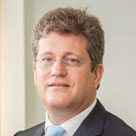
Jacques d’Unienville
CEO of Omnicane
Real Estate & Construction / Mauritius
“The scope of the property market has resolutely leap frogged”
Omnicane made its debuts in the sugar cane industry in Mauritius 90 years ago, and over time has grown into a diversified private conglomerate and a top economic contributor with close to 1,500 employees. Jacques d’Unienville, CEO of Omnicane, tells us more.
In which sectors does Omnicane operate today, and can you give us a brief update on your activities?
We have invested in a modern sugar processing plant that is the focal point of our cane-based agro-industrial ecosystem. Our ethanol plant produces bioethanol from molasses, yet another by-product of the sugar manufacturing process. The bioethanol is exported for the time being with applications ranging from potable alcohol, cosmetic, pharmaceutical, and biofuel. We are also presently setting up a 5 MW hydroelectric power plant in Rwanda while exploring other similar projects in other African countries.
How will your Smart City project contribute to the development of Mauritius’ business ecosystem?
Mon Tresor is the first ever project in Mauritius to obtain the Smart City certification (SCC), delivered by the Board of Investment (BOI). It consists of a major multifaceted business, residential, leisure, educational and media city developments. We have voluntarily opted to enroll the Mon Tresor project for the BREEAM Communities certification, and we are the first in this part of the world to qualify for this internationally recognized and stringent sustainability framework.
How does Omnicane plan to add an innovative edge to the Smart City project?
We have sought and obtained the support of world-class planners with help from the European Investment Bank. All the aspects of the project have the best names and brands around it. This has triggered high-level research involving the best professionals available and also roped in the local communities together with the authorities, who have fully supported the whole project, which covers 480 hectares in close vicinity of the airport. We are now in the construction phase with the ground breaking works having started next to the Holiday Inn Mauritius, yet another Omnicane initiative, which was the very first component of the Smart City.
How would you describe the health of the Mauritian property market today?
With the inception of the smart city scheme and tax incentives, new opportunities have emerged and the scope of the property market has resolutely leap frogged to new horizons. Mon Tresor Smart City is a good example, offering investors a favorably place for those wishing to do business between China and Africa. We are also developing a full-fledged film shooting and post-production facility in Mauritius to attract production outlets from around the world.
How important are Chinese investors and travelers to the future of Mauritius?
Mauritius remains a tourism destination ‘par excellence’, and our island is certainly one of the most stable, reliable business platforms linking Asia and Africa. This is an excellent opportunity for investors who will view Mauritius as a live-work-play destination as projects like the Mon Tresor Smart City take off.
